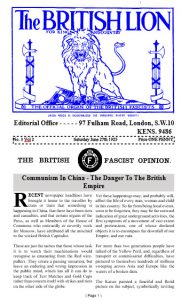 Communism In China – The Danger To The British Empire
Communism In China – The Danger To The British Empire
RECENT newspaper headlines have brought it home to the traveller by tram or train that something is happening in China, that there have been riots and casualties, and that certain organs of the Press, as well as Members of the House of Commons who outwardly or covertly work for Moscow, have attributed all the mischief to the wicked British Capitalist.
These are just the tactics that those whose task it is to watch their machinations would recognise as emanating from the Red wire-pullers. They create a passing sensation, but leave an enduring and wrong impression in the public mind, which has all it can do to keep track of Test Matches and Gold Cups rather than concern itself with strikes and riots on the other side of the globe.
Yet these happenings may, and probably will, affect the life of every man, woman and child in this country. So far from being local events, soon to be forgotten, they may be the outward indication of great underground activities, the first symptoms of a movement of vast extent and pretensions, one of whose declared objects it is to encompass the downfall of our Empire, and our ruin.
For more than two generations people have talked of the Yellow Peril, and, regardless of transport or commissariat difficulties, have pictured to themselves hundreds of millions sweeping across Asia and Europe like the waters of a broken dam.
The Kaiser painted a fanciful and florid picture on the subject, symbolically inviting
all Europe to counter the danger—under his leadership, of course!
But nothing happened, except the Boxer trouble, which, like most risings in the East, flared up with unexpected violence, and as there was no force at the back of it to keep the revolutionary bellows working, was soon extinguished.
The Powers intervened, sent out an International Expeditionary Force under a German Commander, committed the outrage of sacking the Royal Palaces at Peking, did not distinguish themselves either in the direction of mutual cooperation or wise and humane treatment of the Chinese, and finally went away after demanding a huge indemnity. Some of them had the sense and forbearance subsequently to refuse their share of this, but the mischief had been done. The authority of the Throne had been broken, and in 1911 the Manchu Dynasty was replaced by a Republic.
Naturally, visionaries and sentimentalists all the world over hailed the event with satisfaction. China was now to awake from an age-long sleep and enjoy the advantages of Western culture.